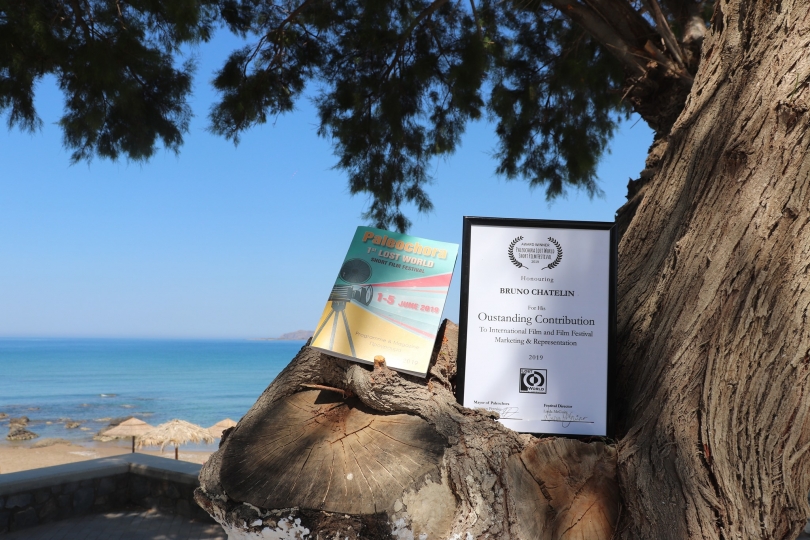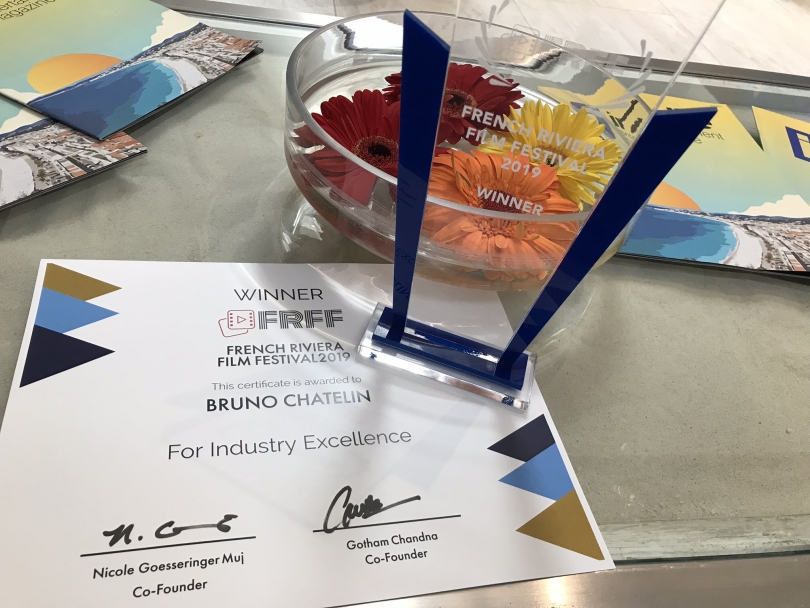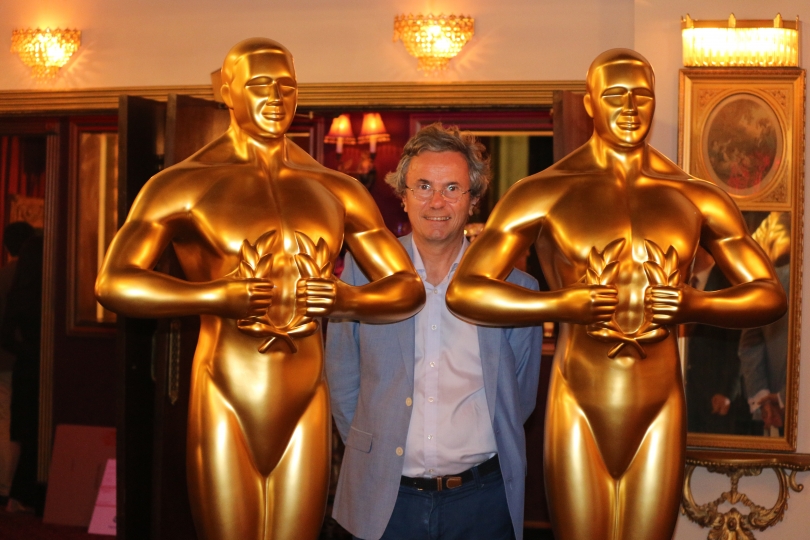He was born of
Renaissance art historian Detlev Freiherr von Hadeln and a renowned sculptor
and painter. He has freelanced as a photographer, worked with Ernest Artaria
and Yves Allégret, and made several documentaries (Le Pelé
and Ombres et Mirages). But for the past 22 years, Moritz de Hadeln has
been the director of the Berlin International Film Festival, a position he took
over from its now deceased founder Alfred Bauer. If you think that festival
director is a prestigious position that is worth careering for then Moritz de
Hadeln will rid you of your illusions. "You don't become director of festival
by choice," he reveals. "It's by accident." Yet, as you might
assume, film festivals have never been very far from his life. "I've been
brought up, if you wish to know, in the Festival die populi in Florence. It
used to be one of the really great festivals in the early sixties, for documentary
filmmakers, that's where you could meet Chris Marker, Joris Ivens..." This
is where Moritz de Hadeln also forged his left-wing political convictions, which
led him to create the Nyon International Documentary Film Festival in 1965.
"I started this festival with my wife. Our motivations at that time were
strictly political. We believed in documentary, we all had the same idea that
documentary could change the society which we live in. It was not the time television
was controlling everything..."
Needless to say,
Moritz de Hadeln is an unchanging believer and he has carried his convictions
with him to the two prestigious international festivals he has headed in the
past 30 years: Locarno and Berlin. "When you talk politically, it's not
for yourself" he asserts, "you try to convince others. So film is
a natural means of communication, and when I got involved with feature films,
that background was already there, in Locarno, and of course in Berlin. I make
no secret of that. I think the great chance that a big festival has is that
we get most of our money from the state. Therefore we are not pushed by considerations
of box office. We don't have to make money selling tickets. Of course, it would
be stupid to have a festival with empty screening rooms. The role of festivals
is also getting people together. But from there on, we can afford to show films
that take risks, with controversial subjects, which have a content of social-political
nature. Whether a film is commercial or not, we couldn't care. I wouldn't say
that film as such can change society - I think I have become with age a little
bit more realistic about that - but I still think that film can help to understand
certain problems.
I'll give a very
good example: Pierre Henri Deleau has shown in the European Film Forum of Strasbourg
one of the Golden Bears of Berlin, In the name of the Father by Jim Sheridan.
We had two discussions with students about Ireland. These French students seemed
to know little or nothing about the history of Ireland, about why this fight...
And there you find out that maybe through a film that can be entertaining, you
can lead people to think about things that are more important than just entertainment.
I think we have refused so far in Berlin - and I hope it will continue that
way - to just show a film for the sake of entertainment. One of the motivations
of the selection was that. Of course, one can also accept that a filmmaker makes
just a beautiful film, an aesthetical statement that does not have a direct
social or political statement. Maybe in what I say you sense a lot of contradictions.
But the truth can only be achieved through contradiction... I'm not the first
to have said that, Mao Tse Tung said it before me. The worst thing is apathy,
people just taking things in and not reacting. And that is the danger of the
TV-zapping generation."
With such bulwark
convictions, Moritz de Hadeln has made it his duty to support directors in peril,
like Pilar Miro. "Those are things which you do by solidarity" says
de Hadeln. "You just don't discuss them. Pilar Miro's The Cuenca Crime
was a very strong film and still is. There was at that time a law in Spain which
said that you are not allowed to criticize the Guardia Civil in public. So we
got the film, which Pilar wanted to be at Berlin, and the screening of Berlin
was a public screening, therefore the Guardia Civil had reasons to put her in
confinement for a very long time. I immediately contacted her lawyer and said
"I am willing to come to Spain to be part of the trial or whatever."
But it was not necessary, as the law was ended. I've had quite a few cases like
that (notably with films by Reinhard Hauff and Herbert Achternbusch). One of
the things you have to have when you do this job is civil courage. You have
to stand up for your own ideas. That is the ABC of any political engagement.
Of course, with age - I'm not so old, I'm only 59 - you kind of relativize things,
but you still kind of believe that socialism or communism was something of an
alternative which brought more justice in society. I think the danger today
is with the collapse of communism, there is nothing anymore that is kind of
stopping the multinationals and the big power game."
In the early 80's
, in spite of the ongoing "Cold War" situation in divided Berlin,
Moritz de Hadeln managed to bring East and the West together at the festival.
As the Berlin Wall fell and German unity was restored, de Hadeln was quick in
seizing the opportunity to make the festival one of the most prestigious meeting
places of the newly born German capital. He further developed the market section
(the festival has the second biggest market section after Cannes, while Venice
has stepped down in that area) and strengthened the ties with the international
film business community.
De Hadeln also
gave a peculiarly salient edge to the Oecumenical Jury prizes. "I think
there is a completely crazy situation" he says when asked why. "On
one side, you have churches involved in the media. And on the other side you
have media that couldn't care less about the churches anymore. So my question
was, instead of making little church juries, why don't you get together, you
might be a little bit stronger. Another reason was that maybe one church would
influence the other, to have a more common, more liberal attitude on the content
of film. The third idea was, we're talking about two countries, Switzerland
and Germany, which have a majority of mixed confessions, and therefore it was
a logical thing. I mean, I would have hoped that these oecumenical juries could
expand their work to work with the orthodox church more, and with the Jewish
community, and why not the Muslim community.
The only thing
is that the only churches which do have film or some media organizations are
the Catholics and the Protestants. The orthodox church has no real one. I mean,
there was a moment when there were two popes in Moscow studying at VGIK and
they were highly interested in film. But I would say that there is no real position
of the church as such. Neither in the Orthodox nor in the Jewish community.
As for the Muslim world, we know that there is a big discussion about cinema.
If you're very strict, you shouldn't even have a painting or a portrait in your
home. And cinema is capturing pictures of people. Immediately after the Khomeini
revolution in Iran, they burned several theaters. So there is a very specific
attitude of the Muslim community towards cinema. I broadened your question in
order to show you that this is part of cinema. You shouldn't forget that Berlin
is also supporting - and it started under my direction - the Gay Teddy Bear,
that there is quite a large segment of gay and lesbian films shown in Berlin.
We're just trying to get everybody together. We're talking about the good things
in Berlin here, but there are also bad things in Berlin. One of the bad things
is that we have never succeeded in getting Africa involved with Berlin. African
cinema is very absent."
Tireless world
traveller, Moritz de Hadeln was one of the first to discover the newly emerging
Chinese cinema. "I had the luck through the Festival of Nyon to meet Edgar
Snow, the American biographer of Mao Tse Tung", he reveals. "So I
had a very early insight into Chinese cinema. I was invited in 1980 to Beijing
when you could only see uniforms in the streets. I must say it was something
of a painful situation, because in public buildings you were not allowed to
have any heating. So I was invited to a screening, it was already November,
it was +3 or 4 degrees in the room, and you can't stay very long, even with
a coat on! Then I found out that the director of the studio had a small electric
stove, and because I was a foreigner, I was allowed to use it. The problem was,
the films were very bad, the acting was still the acting of the Peking Opera,
this kind of very stiff acting. The filmmakers were just discovering how the
cameras were working, and they were using the zoom all the time. And the painful
thing was, as soon as the film was finished, you were invited outside for a
cup of tea, and who was there? The director and the whole crew of the film!
And you know, you've not even finished watching the film, what do you think
of it? You have to be polite...
That was the beginning.
But I think we built up through the years a trust. I disagree with festivals
that now are so proud to show so-called forbidden films from China. I disagree
with Locarno, Marco Mueller... Because, what is the result of it? The censorship
is then tightened for all other festivals and the filmmaker has then trouble
making films for the next ten years. So what's the benefit of that? I think
one has to fight inside China, trying to convince them. That's what I'm doing.
Whether I'm successful or not, I don't know, but having a dialogue with the
authorities is important to get things slowly smoothed. That's also what we
did with Russia at that time."
A great figure
of culture and humanism (he is Commandeur des Arts et Lettres, Commendatore
all Ordine della Republica Italiana and the First Class Merit's Cross of the
Order of Merit of the Federal Republic of Germany among other decorations),
coupled with a brilliant career as festival director, Moritz de Hadeln describes
himself as a "mule." His tenure at the head of the Berlin International
Film Festival certainly had quite a kick. Moritz de Hadeln will step down from
his position in May 2001, for a reason yet unknown.
Robin
Gatto

 Chatelin Bruno
Chatelin Bruno 




























